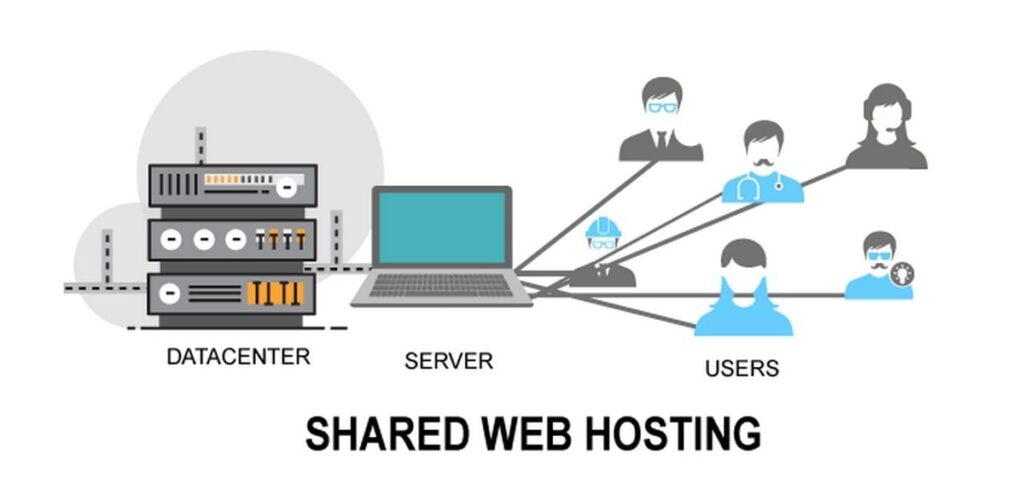When it comes to choosing the right hosting solution for your website, two options often come up in conversation.shared hosting and VPS (Virtual Private Server) hosting. Both have their benefits and limitations, making it essential to understand the differences to decide which is best for your online presence.
In this article, we’ll dive into the key differences between shared hosting and VPS hosting, helping you make an informed decision that aligns with your needs and budget.
What is Shared Hosting?
Shared hosting is one of the most affordable and beginner-friendly hosting solutions available. As the name suggests, with shared hosting, your website shares server resources such as memory, CPU, and disk space with other websites hosted on the same server. It’s like renting a small apartment in a building where you share common spaces with others.
Pros of Shared Hosting:
- Cost-Effective: Shared hosting is typically the most affordable option available. This makes it a great choice for individuals, small businesses, or personal projects on a tight budget.
- Easy to Set Up: Most shared hosting providers offer one-click installs for popular content management systems (CMS) like WordPress, making it easy for anyone to get started with minimal technical expertise.
- Maintenance-Free: The hosting provider takes care of server maintenance, security, and updates, freeing up your time to focus on content creation and growing your site.
Cons of Shared Hosting:
- Limited Resources: Since you’re sharing server resources with other websites, the performance of your site can be affected by the actions of other websites. If another site on the same server experiences a surge in traffic, it could slow down your site as well.
- Lack of Customization: Shared hosting environments are more restrictive in terms of configuration. You won’t have the flexibility to install custom software or make advanced server-level tweaks.
- Security Concerns: Shared hosting can be less secure since vulnerabilities in one website could potentially affect all sites on the server.
What is VPS Hosting?
VPS hosting is a step up from shared hosting, offering more control, flexibility, and power. With VPS hosting, your website still shares a physical server with other websites, but each website is allocated its own dedicated portion of the server’s resources, such as CPU, RAM, and disk space. This setup is more like renting a private apartment in a building, where you have your own space and greater autonomy.
Pros of VPS Hosting:
Better Performance: Since you’re allocated dedicated resources, your website is less likely to experience slowdowns due to other sites on the server. VPS hosting can handle higher traffic volumes more efficiently.
Increased Control: VPS hosting gives you more control over the server environment. You can install custom software, configure settings, and even choose your operating system.
Improved Security: With VPS hosting, your website is isolated from others on the server, offering better security and reducing the risk of cross-site contamination.
Cons of VPS Hosting:
Higher Cost: VPS hosting is more expensive than shared hosting. The additional resources and greater level of control come with a price, making it a better fit for growing websites or businesses that need more power.
More Complex: While VPS hosting offers more control, it also requires a higher level of technical knowledge. You may need to manage server configurations, security patches, and updates, which can be challenging for beginners.
Resource Limitations: Although VPS hosting gives you dedicated resources, the physical server still has finite capacity. If your website grows beyond your allocated resources, you may need to upgrade to a more powerful VPS or dedicated hosting plan.

Key Differences Between Shared and VPS Hosting
| Feature | Shared Hosting | VPS Hosting |
|---|---|---|
| Cost | Cheapest option, affordable for small sites | More expensive, suited for growing websites |
| Server Resources | Shared with other sites | Dedicated portion of server resources |
| Performance | Can be affected by other sites on the server | Consistent performance, even with high traffic |
| Customization | Limited | Greater control and flexibility |
| Security | Vulnerabilities can affect all sites | More secure, isolated from other sites |
| Technical Expertise | Minimal technical skills required | Requires more technical knowledge |
Which One is Right for You?
The right hosting choice depends on your website’s needs, growth potential, and budget. Here’s a quick guide to help you decide:
- Choose Shared Hosting if:
- You’re just starting out with a personal blog, small website, or online portfolio.
- You have a limited budget and need an affordable hosting solution.
- You’re not concerned with heavy traffic or advanced customizations.
- Choose VPS Hosting if:
- You’re running a growing business or a website that expects high traffic.
- You need more control over server settings and configurations.
- You have the technical skills (or are willing to learn) to manage your server environment.
Shared and VPS hosting
Both shared and VPS hosting have their advantages and drawbacks, and the best choice for you will depend on your specific needs. Shared hosting is perfect for small websites and those just starting, while VPS hosting provides the performance, control, and security needed for more demanding websites.
As your website grows, you can always upgrade from shared to VPS hosting to accommodate higher traffic and more complex needs.
By carefully considering your website’s current requirements and future growth, you can make the right decision between shared vs VPS hosting and set your website up for success.

